Newsletter | Modern Love Chennai's Greatest Romance Is With Music
Modern Love Chennai comes like a breath of fresh air not just among the other localised offshoots of the franchise but also in the glut of Indian OTT anthologies, writes Aditya Shrikrishna.
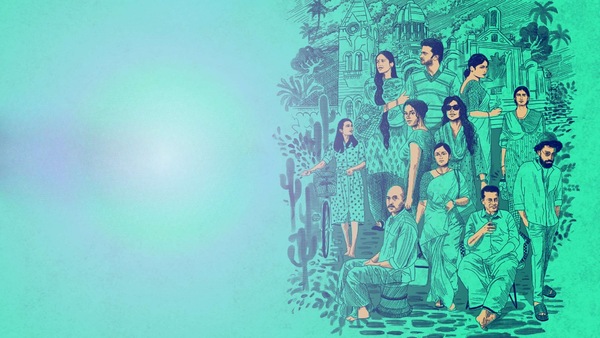
Last Updated: 02.30 PM, May 18, 2023
This column was originally published as part of our newsletter The Daily Show on May 18, 2023. Subscribe here. (We're awesome about not spamming your inbox!)
***
AMAZON PRIME’s Modern Love Chennai, the new anthology based on the eponymous New York Times column, comes like a breath of fresh air not just among the other localised offshoots of the franchise but also in the glut of Indian OTT anthologies of the past few years. Under creative producer Thiagarajan Kumararaja, we get six stories — from six directors and five writers — that explore not just love but also heartbreak, memory and self-realisation that’s more universal and anthropological than modern, which rarely fails if the execution hits.
The stories and treatments are vastly different but there is a throughline. They are all anchored by women, largely focusing on their perspective, and an inventive musical terrain runs like blood in their veins. Not that anyone breaks into song — except in maybe one instance — but music is a handy tool that conveys story or emotion in all of them. No wonder that the anthology is replete with scores and songs from Ilaiyaraaja, Yuvan Shankar Raja, GV Prakash and Sean Roldan; the maestro does the heavy lifting in three films and imparts some lessons along the way. The opening credits are tuned to Yuvan’s theme ‘Yaayum Gnaayum’ over Trotsky Marudu’s sights of Chennai.
In the Akshay Sundher directed Margazhi (adapted and written by Balaji Tharaneetharan), a young girl picking up the pieces of a broken family gathers them only to find first love. Jazmine’s (played by a remarkably restrained Sanjula Sarathi) parents have separated, and her mother has left her to her father. The film is all pastel blue and yellow, the lighting too is uninvited indoors. Jazmine’s loneliness translates through the atmosphere Sundher conjures and breaks through the walls. The outdoors is under clouds and Jazmine and her father Jayaseelan’s home is a dilapidated ruin where he teaches students to play the keyboard and she is a choir girl at the church.
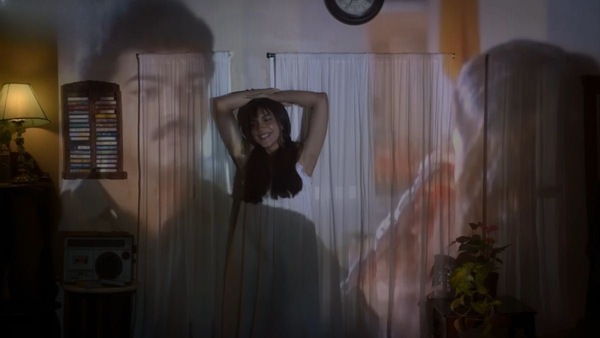
Akshay gives her a leitmotif; she sits alone when the choir breaks for lunch and is glued to her earphones. Usually, filmmakers go for a familiar retro song for these purposes but why fear when the maestro is here? She is listening to the album’s ‘Thendral’ and is always interrupted during her contemplative moment when the song’s keys and strings just begin to unite. A tale of adolescent love, her life is interrupted by Milton (Chu Khoy Sheng) in a similar way. As young as the music is, the dialogues are even more effervescent and simpler. A scene (cinematography by Vikas Vasudevan) with the choir girls pushing their cycle is staged in the most languid fashion. They talk about their first encounter of a naked male and member, and when Jazmine mentions her dream of an undressed Milton, Raaja’s own lines of ‘pudhumai pudhumai vilayattu’ kick in.
The joys of this film are in the seamless transitions in mood — from a melancholic beginning to the throes of being in love and zeroing in on the unspoken parts of it. Like a game of basketball between Milton and Jazmine’s teams where she easily overpowers him or when she becomes conscious of her braces and Sarathi’s minute detailing in her performance when she rarely smiles wide enough for them to be visible in public. Or the effort she puts into her dressing and looks when they begin a tiny courtship. The church setting plays an important part in this tale, from the pastor telling Jayaseelan that once the court order comes, he must update the divorce registry, to Jazmine’s formation of a union within its confines just as one separates. And it is December, the month of Margazhi and Christmas. The film comes full circle, from a divorce to the waltz of guitars signifying youthful zest in ‘Nenjil Oru Minnal’ to ‘Endrum Endhan’ — a happy melody that’s also too short, but memorable beyond life. Like first love.

If Margazhi revolves around a pair of younglings, Balaji Sakthivel’s Imaigal (again written by Balaji Tharaneetharan) skips the years from college romance to midlife torment in the span of 42 minutes. Starring TJ Bhanu as Devi and Ashok Selvan as Nithiya, the film sets its eyes on the labour of the woman in the family as her world diminishes from her purview as the years pass. This is literalised by Devi’s retinal degenerative disease, her vision beginning to blur in the periphery during college to going completely blind in about a decade. When Nithiya is asked to take a day to decide weighing their shared future, he responds in a seemingly informed affirmative. He doesn’t say a word, he returns with ‘Devi’ tattooed on his chest.
The film is minimalist in its approach. For such a plot point, Imaigal is a riot of few words and a lot of colours (shot by Jeeva Sankar). When Devi and Nithiya enjoy their dating years followed by marital enthusiasm, Sakthivel imparts various hues in hill stations, lakes, boats and Ferris wheels. Yuvan’s ‘Peranbae’ plays through these images, and we almost quickly jump to Devi in a hospital bed unable to spot her new-born daughter’s face clearly from the side. She quits her job to stay at home and take care of the family just as Nithiya’s vision goes blind even with a pair of healthy eyes. An argument in the middle of the road is Imaigal’s best moment, the husband coming to terms with his wife’s physical and emotional labour when she explains what she stands to lose by losing vision, Yuvan’s keys spreading a lilt over Devi’s life, a rhythm that suddenly stops as she begins to make her point. The film ends on a musical note; Yuvan’s score drowns out what could have been diegetic, a tiny anomaly in an otherwise interesting work.
While retro might signify Ilaiyaraaja (the Modern Love Chennai soundtrack disproves that notion), for a certain generation Deva’s ‘Meenamma’ from Aasai could be the same. It’s what a local self-styled parody of a godman is listening to when Vaijayanthi (Vasundhara Kashyap) takes Shoba (Sri Gouri Priya) to him. Shoba recently had an abortion and Vaijayanthi wonders what the future holds for her but Shoba storms out of the place announcing that she’ll live life on her terms. Rajumurugan’s Lalagunda Bommaigal is about the women in North Chennai who work in a bakery. As is par for the course for Rajumurugan, words like socialism appear out of nowhere and there is talk of Urdu, Telugu and Tamil co-existing in the area but rarely intermingling.
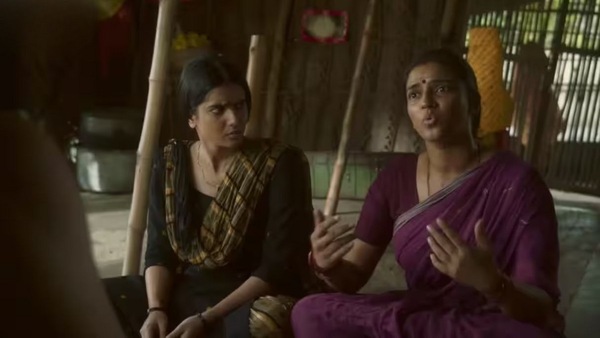
This is Mint Street — colourfully shot by Nirav Shah — with its clock tower, so the food stall also employs migrant labourers from northern India, one of whom is Nathuram (Vasudevan Murali). This is new territory for Rajumurugan, the subject raw and weighty but the treatment surprisingly light-hearted. A whole musical number with Sean Roldan’s ‘Jingura Dhanga’ is filmed to Shoba’s rollercoaster relationship with men around her. The setting is pulpier and focuses on discord within plurality and the idea of slicing out the bad parts from an apple because one can stay secure but not hungry. The film works in parts mostly thanks to Sri Gouri Priya and Vasundhara’s performances, but the idea is not as fleshed out as one would like. Unconvincing actors playing Hindi speaking roles doesn’t work in the film’s favour.
In Kaadhal Enbadhu Kannula Heart Irukkara Emoji, Reshma Ghatala (writer) and Krishnakumar Ramakumar (director) attempt a playful tribute to romantic films, especially those made by Gautham Vasudev Menon. It is helmed by Ritu Varma as Mallika, a role that could have been played by the likes of Nazriya, Genelia or Asin about a decade ago but is laughably silly now. Mallika loves romantic movies; they are her bread and butter, and she goes through a string of failed relationships — from unrequited love in school to an unfaithful boyfriend in college followed by a casteist masquerading as a progressive partner at her workplace.
This is all treated with humour, peppered by visuals from Alaipayuthey, Kadhalukku Mariyadhai and several Menon films including borrowing from Padayappa Neelambari’s playbook for post-breakup cold turkey. A stretch of Tinder dates is the only funny element in the film, one that ends with a two-second Nalan Kumaraswamy cameo quoting his film, and another cameo by a film critic that plays the logline of the film too straight. Krishnakumar’s film is essentially about the heightened nature of love and melodrama on film, especially Indian cinema and how that rarely translates to reality. While Mallika’s rite of passage feels real, the journey itself is uninteresting.
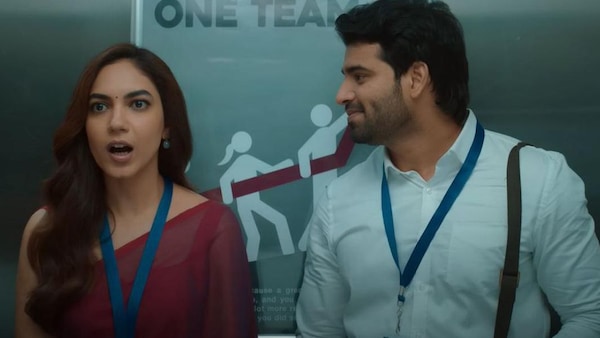
Bharathiraja’s film is the biggest surprise of Modern Love Chennai. Its title might evoke Kannadasan’s ‘Manithan Enbavan Deivam Aagalam’ from Sumaithaangi; it’s called Paravai Kootil Vaazhum Maangal. The song talks about man’s capacity to elevate himself by good deeds and a big heart, and in Bharathiraja’s film (written by Pratheep Kumar S), two women elevate themselves by understanding not just each other but also going after what they really want from their lives.
Revathi (Ramya Nambeesan) and Rohini (Vijayalakshmi) are all heart. Ravi (Kishore) meets Rohini in the Chennai metro and strikes up a relationship. In an offhand way we find out that Ravi has a family with Revathi, even as Rohini is sitting in the same compartment. The devil is in the details in this film — a lot is conveyed with looks, geography and staging. The relationship between Ravi and Rohini builds up with an old song in the background (a deliberate choice) and the next instant we step into his house as the three characters attempt to divide their lives. A small kitchen serves its purpose — “there is room only for one person”, Revathi tells Rohini and considers an analogy to explain to her kids why she and Ravi are legally separating. This is a sleight of hand not seen from Bharathiraja in a long time, his blocking of actors in the all-important scene at Ravi’s home where he speaks little and Revathi and Rohini hold forth with mute observation, staccato dialogues and performance steeped in realism.
Revathi sits in darkness, her old life gradually withering while Rohini shines bright as she discovers her new life. This is transfer of labour, love and knowledge in real time with curious interruptions from Ravi’s father (played by Delhi Ganesh). They have dinner in darkness, and spasmodic but hardly awkward conversation drives the needle forward. After Ravi’s conversation with his father, there is a tiny shot of Revathi walking out and Rohini staying in the kitchen, the evening’s mission accomplished. Bharathiraja’s film is a lovable ballad; a beautiful medium shot at dawn (cinematography by Jeeva Sankar) shows the women talking about emptiness giving way for clarity; we hear the song of the morning birds — the birds that can accommodate others as family. All this points to a certain Indian cinema giant’s sleight of hand. Bharathiraja’s trademark is replaced by ‘en iniya nanban’ followed by the name of that giant — Balu Mahendra.
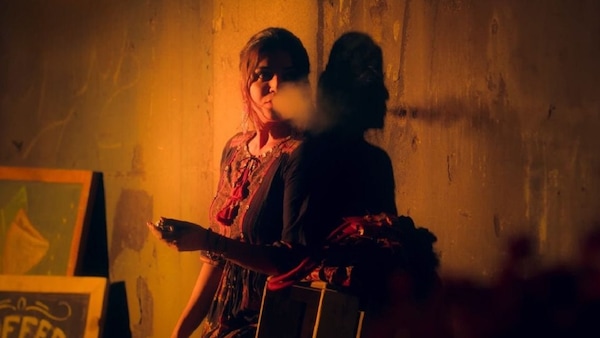
Thiagarajan Kumararaja too borrows his title from a song — Ninaivo Oru Paravai. He also situates it in his cinematic universe — the fifth film after Oram Po, Aaranya Kaandam, Va Quarter Cutting and Super Deluxe. The film is about the games memory plays with people and those that people play with memory. The colours, the noirish interiors and a disregard to light itself gives this film all the flavours: What happens behind closed doors? Or in a person’s mind? This is new territory for the filmmaker in one fashion; he’s used Ilaiyaraaja’s old songs in his films, but this is the first time we see him with the maestro’s original compositions, and they are a blend of blues, jazz and orchestral crescendos keeping with the wistful mood piece of love and sex it is.
For a film that shows some and talks a lot about sex, it clocks at 69 minutes, effectively making it his third feature. K (Pb) and Sam (Wamiqa) separate after breakup sex, so orgasmic and casual that they cannot believe that they are separating (he washes the utensils before leaving). It is set to Raaja’s ‘The Good Bye’, not “goodbye”. That is until the film thrusts us in between Sam and her therapist, trying to get over K. He is trapped in her memory and Ilaiyaraaja’s lovesick ‘Aanaal’ follows as she throws away his belongings to decouple even as the song wonders if thoughts about her ever haunt him. This is Thiagarajan Kumararaja going Jarmusch by way of Godard in the way he handles the couple’s easy interplay with a touch of gloom introduced by a freak plot twist and Nirav Shah’s stylised cinematography.
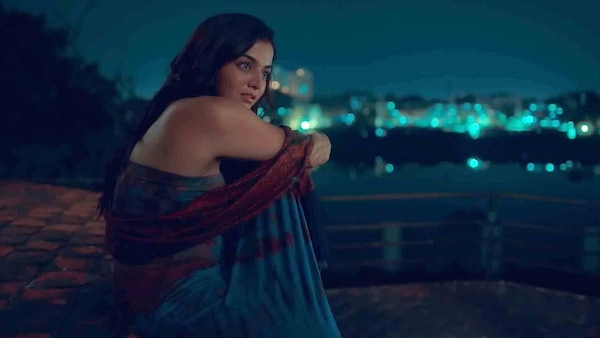
Light simply does not fall over Sam in this film, it meanders at the edges of the frames. Her home is the main setting, with dark blues, shards of greys and blacks, sometimes there is red and pink. Wamiqa and Pb have great chemistry, their conversations are easy and matter of fact, there is harmony in intimacy, and the director uses it in many ways — they speak of how stories don’t add fillers in between moments, like a missing jigsaw piece. And from the inside we see Sam close the door to leave town (in the background is the ‘Thiruppavai’ we just heard in Ponniyin Selvan 2) and there is no cut before the same door opens and she returns. Where are the missing pages in our memory or can we erase them at will? Just as her memory will continue to punish her, an accident erases K’s entire memory except his relationship with Sam.
Ninaivo Oru Paravai is a true musical interspersed with conversations. The film is non-linear, its structure dictated by what Sam chooses to tell K, be it their greatest sex filmed with Kaamathu Paal, the filmmaker going for the wordplay to illustrate heightened sexual pleasure, or two scenes of Sam walking in hesitation to meet K, both scored to a track titled ‘Uncertainty of Future’. This is a play on the musical, like Leos Carax’s Annette, but within the Indian grammar of incorporating music. It is also dictated by the director’s intense urge to use Raaja’s operatic soundtrack, moving from one piece to another, each song a memento for Sam and K. A traumatic ‘Then Mazhaiyo’ is followed by a heavy, joyful moment fastened to ‘Sooriyan Thondrudhu Saamatthile’. A newly discovered memory — as if it was found footage — plays to the beginnings of ‘Kannil Pattu Nenjai Thottu’ and its racing tempo is used again for the first meet-cute that we see immediately after. This is a tribute that is akin to a prayer, from a filmmaker to the rarest of musicians, every frame and sound washed over by felt love.

